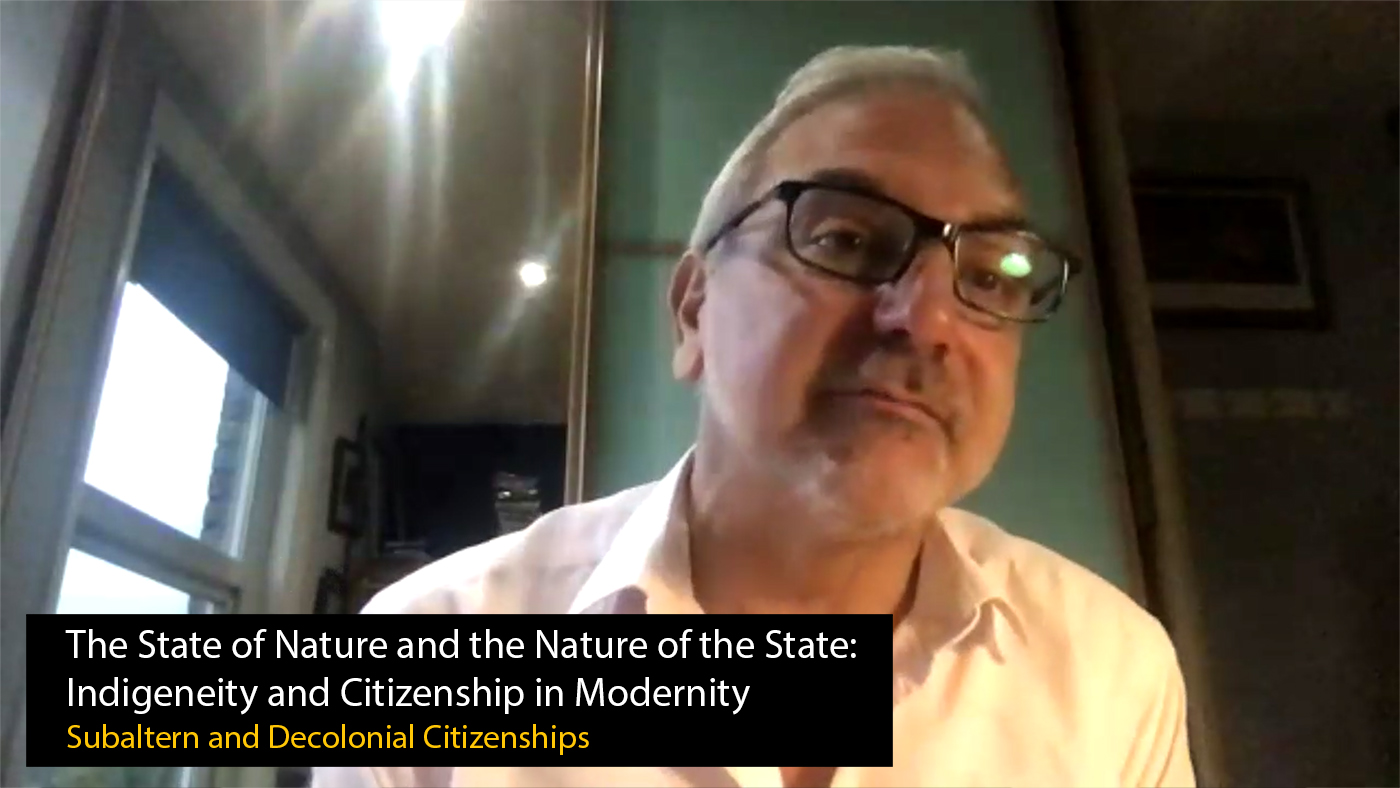Subaltern and Decolonial Citizenships - 29 October 2020 - The State of Nature and the Nature of the State: Indigeneity and Citizenship in Modernity
Duration: 2 hours 7 mins
Share this media item:
Embed this media item:
Embed this media item:
About this item

| Description: |
Speaker
Andrew Canessa (University of Essex) Abstract The paper presented here is a chapter from a forthcoming book with Manuela Picq, 'Indigenous People and the State from Hobbes to Evo Morales'. In this chapter, we challenge the idea that indigenous peoples are ontologically beyond or marginal to the state and suggest the opposite: they were integral to the formation of the post Westphalian state which imagined states and citizens in direct contrast to what Europeans imagined as indigenous. That is, the very idea of indigeneity is a necessary product of modernity. We take the idea that indigenous peoples are, in Karena Shaw’s words "Hobbes’ borderguards" and explore how indigenous people actively construct and contest the (post) colonial state. Since indigeneity has long been constructed as an anti citizenship, a refusal, rejection, or exclusion from canonical state-subject relations, it is also a way of critiquing the state and, in our concluding remarks, we give some thought to new ideas of citizenship arising from indigenous movements. About the Speaker Andrew is a social anthropologist and has worked for many years with Aymara speakers in highland Bolivia and has published widely on issues of indigeneity, race, gender, and sexuality. More recently he was the PI in an ESRC funded project looking at the evolution of a British Gibraltarian identity over the course of the 20th century. |
|---|
| Created: | 2020-11-13 11:18 |
|---|---|
| Collection: | Subaltern and Decolonial Citizenships |
| Publisher: | University of Cambridge |
| Copyright: | Glenn Jobson |
| Language: | eng (English) |
| Keywords: | CRASSH; Subaltern and Decolonial Citizenships; Andrew Canessa; |
| Abstract: | Speaker
Andrew Canessa (University of Essex) Abstract The paper presented here is a chapter from a forthcoming book with Manuela Picq, 'Indigenous People and the State from Hobbes to Evo Morales'. In this chapter, we challenge the idea that indigenous peoples are ontologically beyond or marginal to the state and suggest the opposite: they were integral to the formation of the post Westphalian state which imagined states and citizens in direct contrast to what Europeans imagined as indigenous. That is, the very idea of indigeneity is a necessary product of modernity. We take the idea that indigenous peoples are, in Karena Shaw’s words "Hobbes’ borderguards" and explore how indigenous people actively construct and contest the (post) colonial state. Since indigeneity has long been constructed as an anti citizenship, a refusal, rejection, or exclusion from canonical state-subject relations, it is also a way of critiquing the state and, in our concluding remarks, we give some thought to new ideas of citizenship arising from indigenous movements. About the Speaker Andrew is a social anthropologist and has worked for many years with Aymara speakers in highland Bolivia and has published widely on issues of indigeneity, race, gender, and sexuality. More recently he was the PI in an ESRC funded project looking at the evolution of a British Gibraltarian identity over the course of the 20th century. |
|---|---|
Available Formats
| Format | Quality | Bitrate | Size | |||
|---|---|---|---|---|---|---|
| MPEG-4 Video | 1280x720 | 2.95 Mbits/sec | 2.75 GB | View | Download | |
| MPEG-4 Video | 640x360 | 1.8 Mbits/sec | 1.68 GB | View | Download | |
| WebM | 1280x720 | 1.62 Mbits/sec | 1.52 GB | View | Download | |
| WebM | 640x360 | 528.9 kbits/sec | 491.98 MB | View | Download | |
| iPod Video | 480x270 | 477.42 kbits/sec | 444.09 MB | View | Download | |
| MP3 | 44100 Hz | 250.83 kbits/sec | 233.32 MB | Listen | Download | |
| Auto * | (Allows browser to choose a format it supports) | |||||

